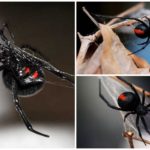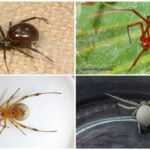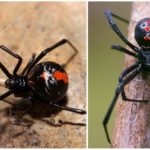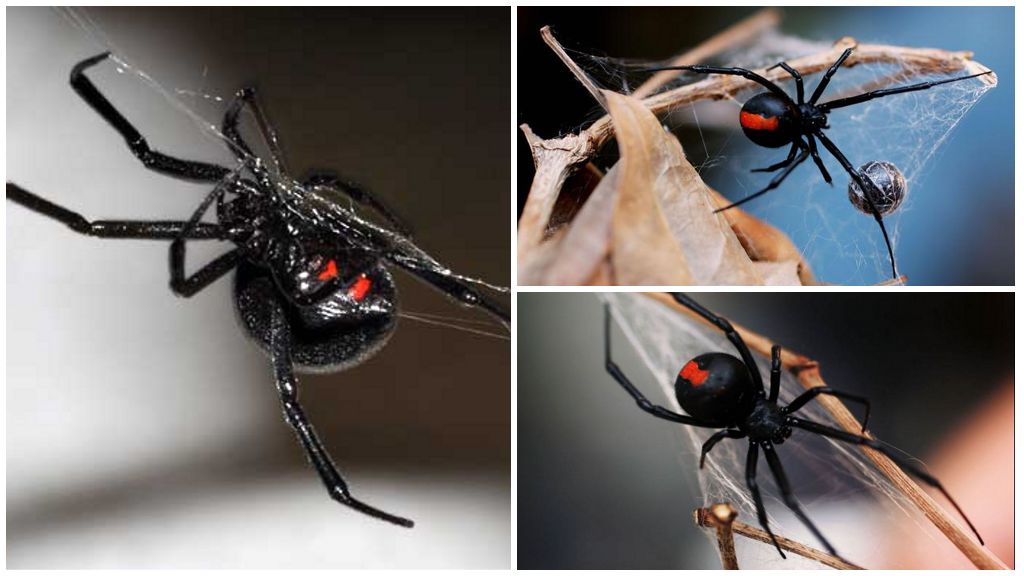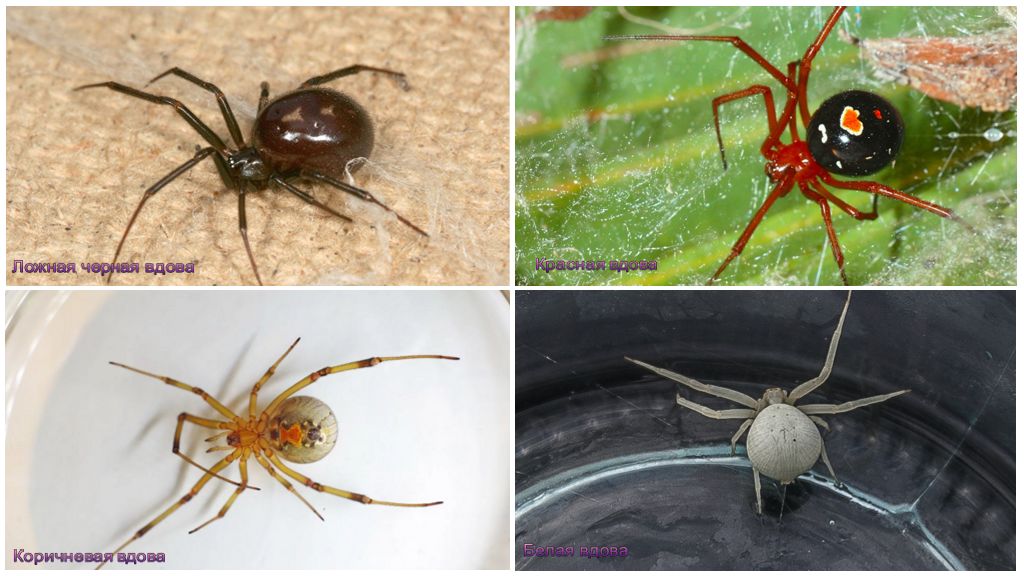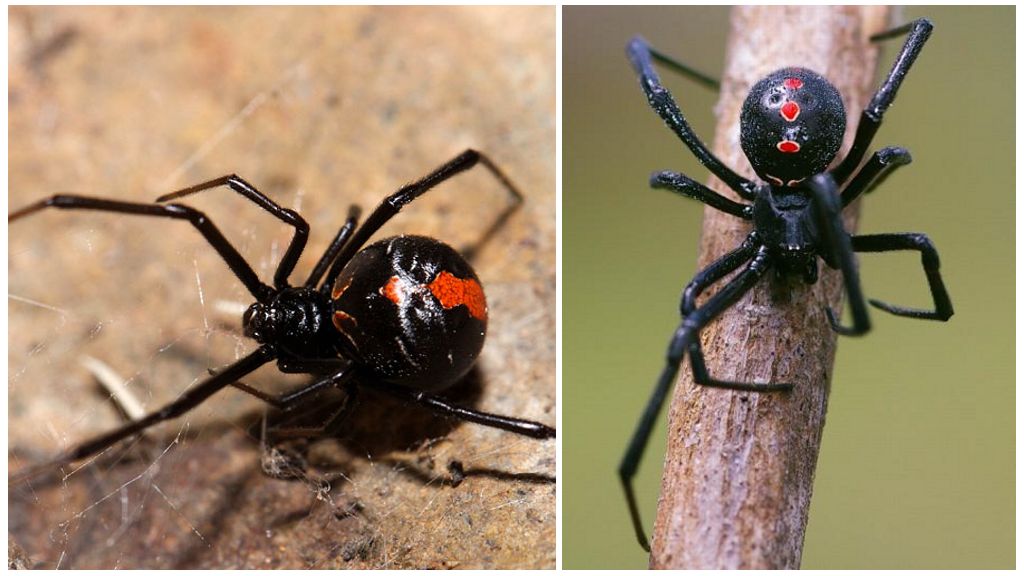Description and photos of the black widow spider
Content
- Black widow spider
- Types of black widow
- Black widow spider
The black widow spider or Latrodectus mactans is distributed throughout the continents of the globe. Homeland is North America. Over time, the arthropod appeared on the territory of Australia, Oceania. Separate species are found in Africa, Asia, and Europe. In total there are 31 types of black widows, the bites of some of them end in the death of animals, man.
What does a black widow look like
The main feature of the spider are moderately long legs with bristles.With their help, the black widow skillfully throws the web on the prey. In the networks of the spider are often insects, beetles, caterpillars, as well as amphibians, rodents.
On a note!
The colors of the abdomen of each species may differ, but the legs are always black. A true black widow has a brilliant glossy black body, long powerful legs. A distinctive feature of the spider is the presence of a pattern on the lower part of the abdomen in the form of a red hourglass. The males do not have such identification marks.
The body of an adult female reaches the size of 2 cm, legs - 5 cm. Males are always smaller. There are 6-8 eyes on the head, but the spider is weak. Helps to orient in the organs of touch. The predator feels the approach of the prey by the vibrations of the air, the cobwebs.
Photos and descriptions of other species:
- False black widow. It dwells on all continents, differs from its relative in the color of the characteristic pattern. Instead of red hourglasses, they are pink. The spider leads a similar way of life, but is better adapted to the harsh climatic conditions. It is found on the territory of Russia, Ukraine, other CIS countries. The poison is less toxic, but not so much as to attribute arthropod to harmless creatures.
- Red widow.It lives in several places in Florida. The size, shape of the body is no different. The color of the chest, legs - red, orange. The abdomen is black with yellow rings around. Lives in a wild environment under the leaves of a sandy pine. A bite does not represent a great danger to humans. But there is local irritation, pain, swelling.
- Brown widow. Distributed in America. Differs in a brighter color - orange, brown, red. On the underside of the underside, the hourglass pattern is bright yellow, orange. The spider tries to stay away from people, their homes, lives in the wild. Bites to protect his own life. The bite is the weakest of all types of widows, but is valued in medicine.
- White widow. Refers to karakurt. It is found on the territory of Russia. Differs in a light color - white, yellow. It hunts insects, caterpillars, beetles. The poison is not a mortal danger to humans, but leads to a temporary deterioration of health, causing weakness, headache, nausea, pain in the places of attack.
A photo of a black widow spider can be seen below. There, the young at different stages of development, which differ from adults in size, lighter color.
origin of name
A black spider with a red hourglass on the abdomen is well known around the world, not only because of the extremely toxic poison, but also a certain way of life. Male and female are found only for mating in the mating season. It is important for the “caretaker” to calculate in advance the mood of his “passion” A hungry female will eat his partner before he starts his marriage games. If a spider waits for a male, he calmly approaches her, does his job.
The fate of the "man" is directly dependent on his physical condition, as well as on how well fed the female is. If the widow suddenly gets hungry, eat the "boyfriend" in one instant. The same thing happens with a weakened spider that mates with several spiders. A strong male can crawl away safely, and then reappear for another mating.
The second name - the black death, arthropods received because of a strong poison. Toxic substance injects a widow with a bite. The poison of a spider kills a horse in a few minutes; in the absence of timely qualified help, a person dies in half an hour.
On a note!
The black name of the black widow is Latrodectus, derived from the Greek,literally means "biting in secret." Spider hiding in a secluded place, waiting for the victim. He attacks a person for the purpose of his own self-defense. The inconspicuous black color helps to mask in the dark, when animals are most active.
Where spider lives
Varieties of black widows are present on all continents. The most dangerous live in tropical countries. According to official data, there are 13 species living on the American continents, African and Eurasian - 8 each. In Oceania, Australia there are 3 species. One is found on all continents of the globe with the exception of Eurasia - Latrodectus geometricus.
In the wild, spiders live in the midst of vegetation, under stones, in tree hollows, in soil. Weave trap nets. Once in the house, hiding in the corners, behind the furniture, in shoes, lockers, any places where there are no direct sunlight. Habitat in Russia - the south of the country, forests, forest-steppe.
On a note!
Often, a black widow is brought up as a pet. By itself, she does not attack, but attacks in self-defense. Keep it in a special terrarium. He lives in captivity for about 4 years, in nature - 12 months.
Lifestyle
Spiders live alone.Gather in pairs just for mating. After fertilization, the female lays up to 900 eggs at a time. Envelops them with cobwebs, forms a cocoon, drags along. In 4 weeks spiders form inside, which are also cannibals. In the cocoon, they feed on each other, the strongest appear in the world. A maximum of 10 cubs remain alive. For some time, the younger generation holds on to the mother, then creeps in different directions.
The black widow feeds mainly on insects, bugs, larvae, weaker spiders. Often snakes, snakes, frogs, lizards, rodents are caught in the web. The predator paralyzes them with poison, injects saliva, which dilutes the insides, then calmly drinks.
On a note!
Spiders, like the black widow, lead a similar way of life, but have a less toxic poison. The most similar karakurt. Many species are found in Russia. Often they are called false widows.
Danger of poison
The black widow spider's bite is 15 times more toxic than a rattlesnake poison. In the world every year more people die from attacks by spiders than from sharks, snakes. In terms of frequency of bites, the black widow comes first.
Death can occur in cases of weakened or pathologically weak immunity. More serious consequences for young children, the elderly, the sick. Manifestations begin a few minutes after being bitten. The complexity of the situation depends on the amount of poison in the blood. When providing timely medical care, a person successfully recovers.
The poison spreads throughout the body, affects the nervous system. Causes severe muscle spasms. As a result, the following symptoms appear:
- increased salivation;
- lacrimation;
- dizziness;
- headache;
- nausea;
- vomiting;
- abdominal pain;
- tachycardia;
- vomiting;
- urinary incontinence;
- diarrhea;
- pallor of integuments;
- dyspnea;
- muscle spasms;
- high blood pressure;
- anxiety;
- weakness.
At the site of the bite there is pain, swelling, redness. Over time, suppuration appears. The moment of attack itself is felt as a needle prick. The most dangerous female in the battle period, at the moment of gestation. Males are less poisonous, not so active.

